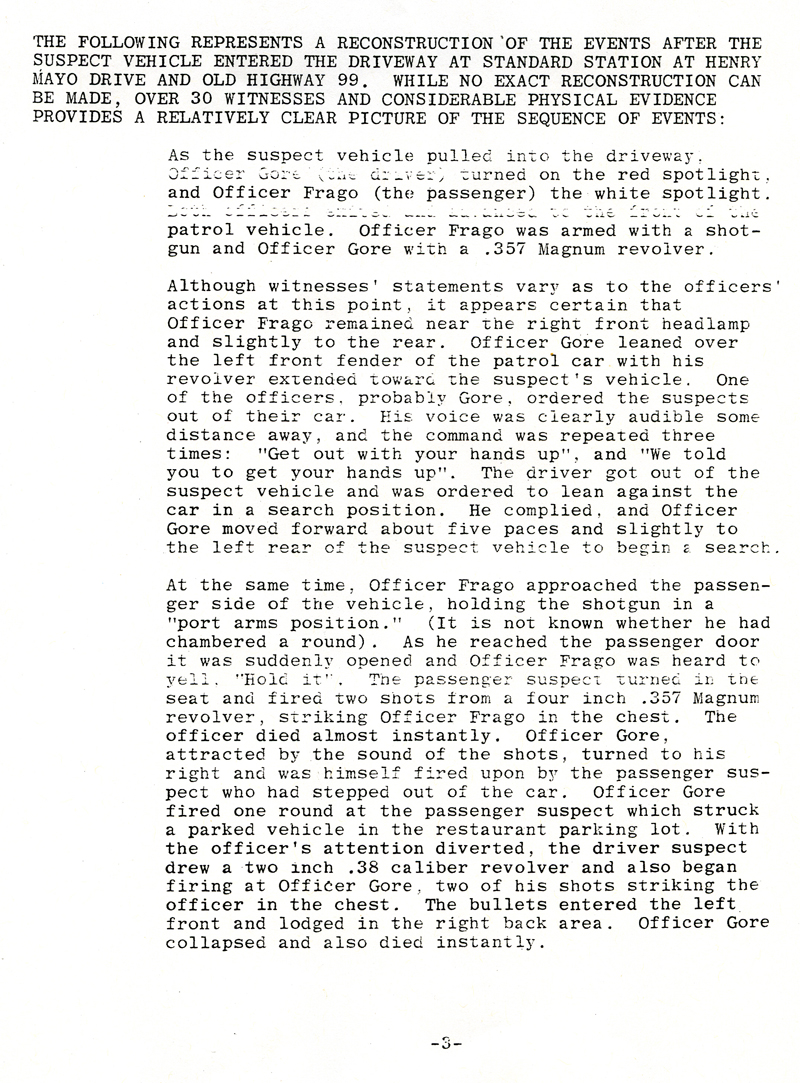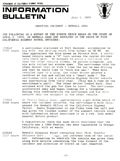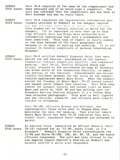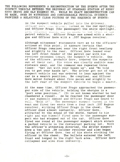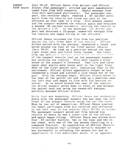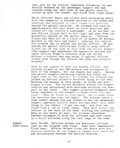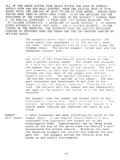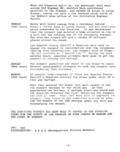DEPARTMENT OF CALIFORNIA HIGHWAY PATROL
INFORMATION BULLETIN
JULY 1, 1970
SHOOTING INCIDENT - NEWHALL AREA
THE FOLLOWING IS A REPORT OF THE EVENTS WHICH BEGAN ON THE NIGHT OF APRIL, 5, 1970 IN NEWHALL AREA AND RESULTED IN THE DEATH OF FOUR CALIFORNIA HIGHWAY PATROL OFFICERS:
THE FOLLOWING REPRESENTS A RECONSTRUCTION OF THE EVENTS AFTER THE SUSPECT VEHICLE ENTERED THE DRIVEWAY AT STANDARD STATION AT HENRY MAYO DRIVE AND OLD HIGHWAY 99. WHILE NO EXACT RECONSTRUCTION CAN BE MADE, OVER 30 WITNESSES AND CONSIDERABLE PHYSICAL EVIDENCE PROVIDES A RELATIVELY CLEAR PICTURE OF THE SEQUENCE OF EVENTS:
As the suspect vehicle pulled into the driveway, Officer Gore (the driver) turned on the red spotlight, and Officer Frago (the passenger) the white spotlight. Both officers exited and advanced to the front of the patrol vehicle. Officer Frago was armed with a shotgun and Officer Gore with a .357 Magnum revolver.
Although witnesses' statements vary as to the officers’ actions at this point, it appears certain that Officer Frago remained near the right front headlamp and slightly to the rear. Officer Gore leaned over the left front fender of the patrol car with his revolver extended toward the suspect's vehicle. One of the officers, probably Gore, ordered the suspects out of their car. His voice was clearly audible some distance away, and the command was repeated three times: "Get out with your hands up", and "We told you to get your hands up". The driver got out of the suspect vehicle and was ordered to lean against the car in a search position. He complied, and Officer Gore moved forward about five paces and slightly to the left rear of the suspect vehicle to begin a search.
At the same time, Officer Frago approached the passenger side of the vehicle, holding the shotgun in a "port arms position." (It is not known whether he had chambered a round). As he reached the passenger door it was suddenly opened and Officer Frago was heard to yell. "Hold it'. Tne passenger suspect turned in the seat and fired two snots from a four inch .357 Magnum revolver, striking Officer Frago in the chest. The officer died almost instantly. Officer Gore, attracted by the sound of the shots, turned to his right and was himself fired upon by the passenger suspect who had stepped out of the car. Officer Gore fired one round at the passenger suspect which struck a parked vehicle in the restaurant parking lot. With the officer's attention diverted, the driver suspect drew a two inch .38 caliber revolver and also began firing at Officer Gore, two of his shots striking the officer in the chest. The bullets entered the left front and lodged in the right back area. Officer Gore collapsed and also died instantly.
They called it the "Newhall Incident." It was the worst massacre of police officers in the 80 year history of the California Highway Patrol, and possibly the worst in American history. It changed police procedure forever thereafter — improved police training on how to approach a suspect, better weaponry, bullet proof vests — saving the lives of many police officers in the line of duty. It was the story of the bravery and sacrifice of four young CHP officers, and the story of a true American hero, a civilian bystander who risked his life under fire from gun toting suspects to try to save the life of a downed patrolman. On the evening of April 5, 1970, four CHP officers, Roger Gore, Walt Frago, James "Skip" Pence, and George Alleyn were brutally gunned down by two dangerous suspects in the lot of a Standard Service Station next to J's Coffee Shop on what is now the intersection of the Old Road and Magic Mountain Parkway in Valencia, California.
The two suspects were down and out career ex-convicts. They had met and became friends while in prison. Jack Twinning had just been released from the Federal Penitentiary in Tallahassee, Florida eleven months previously. At age 34, he had been in and out of eight federal prisons for various offenses since the age of 16. Bobby Augustus Davis had been released from prison 8 months previous and was serving his parole time in Houston, Texas. Both had tried and failed to land legitimate jobs after leaving prison. They met again in Houston and rode out to California to turn back to the "dark side" and score a big hit. After staying for a while in Sacramento and failing to pull off an intended bank robbery, they rode down to Los Angeles in a red Pontiac. As they drove south on Highway 99 between Gorman and Newhall, they noticed lots of construction along the highway and figured they could come back to steal explosives from the construction sites when they were ready to pull a robbery. In the car with them was a veritable armory of guns.
After renting an apartment in Long Beach, the suspects encountered an armored truck delivering cash to the Santa Anita Racetrack. They tracked the truck on its usual route and decided on a plan to rob the truck on a freeway ramp. But to accomplish their diabolical plan, they needed explosives. Late in the evening of April 5, 1970, they returned to the construction site between Newhall and Gorman on the northbound Golden State Freeway with the intent of procuring the explosives. Twinning left the car to search for explosives. Davis stayed in the car and parked on the side of the road behind a family stranded with an overheating radiator. With the family eying him suspiciously, Davis got nervous and made a quick U-turn on to the southbound side of the highway...
Ivory Jack Tidwell and his wife Pamela were traveling southbound on Highway 99 when they were almost sideswiped by Davis in the Pontiac as he made his U-turn. They took down the license plate number of the car. Tidwell was quite angry and pulled up alongside the Pontiac to tell the driver off. But Davis reacted by pointing a two-inch revolver at the Tidwells. Tidwell sped away and pulled off the highway further down the road to call the police and report the violent encounter.
The four young officers were relatively new to the CHP, having graduated from the police academy less than two years before the incident. Partners Roger Gore and Walt Frago spotted the Pontiac, now occupied by both suspects, as it headed south through the Newhall area. They followed the Pontiac as it pulled off on to Henry Mayo Drive (now Magic Mountain Parkway). James Pence and George Alleyn, driving in their patrol car northbound at Lyons Avenue, picked up the radio call from Gore and Frago and prepared to back them up. The suspects turned north on to what is now the Old Road and pulled into the driveway of a Standard Gas Station located next to J's Coffee Shop on the current site of Marie Callender's Restaurant. J's had just opened its business in 1969 or 1970. Prior to J's, there had been a Tip's Restaurant on this location (James Dean possibly stopped and ate there as he headed to his fatal accident outside Cholame in 1955).
The CHP officers flashed the red lights of their patrol vehicle as Gore got out to apprehend the suspects. While Gore patted down Davis, Frago covered him with a shotgun. Suddenly Twinning got out of the car and fatally shot Frago with two bullets from a .357 magnum. The horror had begun. Distracted by the gunfire from the passenger, Gore could not react in time as Davis shot him with a Smith and Wesson revolver.
"Newhall, 78-12! 11-99! Shots fired. J's Restaurant parking lot." Pence sent this desperate dispatch message as he and Alleyn pulled into the gas station driveway and saw their two comrades lying on the pavement. A gun battle ensued between the suspects crouched behind the Pontiac and the two officers. Despite their best efforts, both Pence and Alleyn were shot and killed during the battle with the suspects, Pence at close range in an execution style slaying.
Throughout history many tragedies have been accompanied by great heroism. The Newhall Incident was no exception. Gary Dean Kness was driving by J's Coffee shop on his way to work when he saw the gun battle taking place at the Standard station. As he saw one of the wounded officers fall to the ground, Kness raced out of his car to the officer's side, and tried to pull him out of the line of fire. While helping the officer, Kness saw one of the suspects approaching him with a sawed-off shotgun. He instinctively picked up the officer's shotgun and attempted to fire at the suspect, but the gun was empty. He then picked up a revolver and was able to fire off a shot at the suspect, who took off and ran wounded from the gunshot. Kness was honored by the CHP for his heroic efforts to save the officer, both on June 5, 1970 at a Memorial Wall dedication at the Highway Patrol office on the Old Road, and in April, 2008 when a portion of Interstate 5 was named for the four downed officers.
Never before had so many officers been killed in one incident. In the aftermath of the shooting, the two suspects took off in opposite directions by foot. Davis headed up San Francisquito Canyon Road where he was apprehended by police officers. He was eventually convicted and sentenced to death. His sentence was changed to life in prison when the California Supreme Court outlawed the death penalty. He remains in prison to this day. Twinning ended up barricaded in the home of Steven and Betty Jean Hoag on Pico Canyon Road near the Old Road, where he shot himself to death when the house was surrounded by the police. He had previously sworn that he would never return to prison.
The Newhall Incident left in its wake four young widows and nine fatherless children. Sympathy poured in from a stunned community as over 5000 letters were sent to CHP headquarters with nearly $100, 000 in donations for the families. But Gore, Frago, Pence, and Alleyn did not die in vain. As a result of their sacrifice, police procedures were re-examined and changed, making the jobs of police officers across the country much safer to this day. Many more lives of police officers may have been lost if not for the tragic loss of life on the worst day in the history of the CHP.
